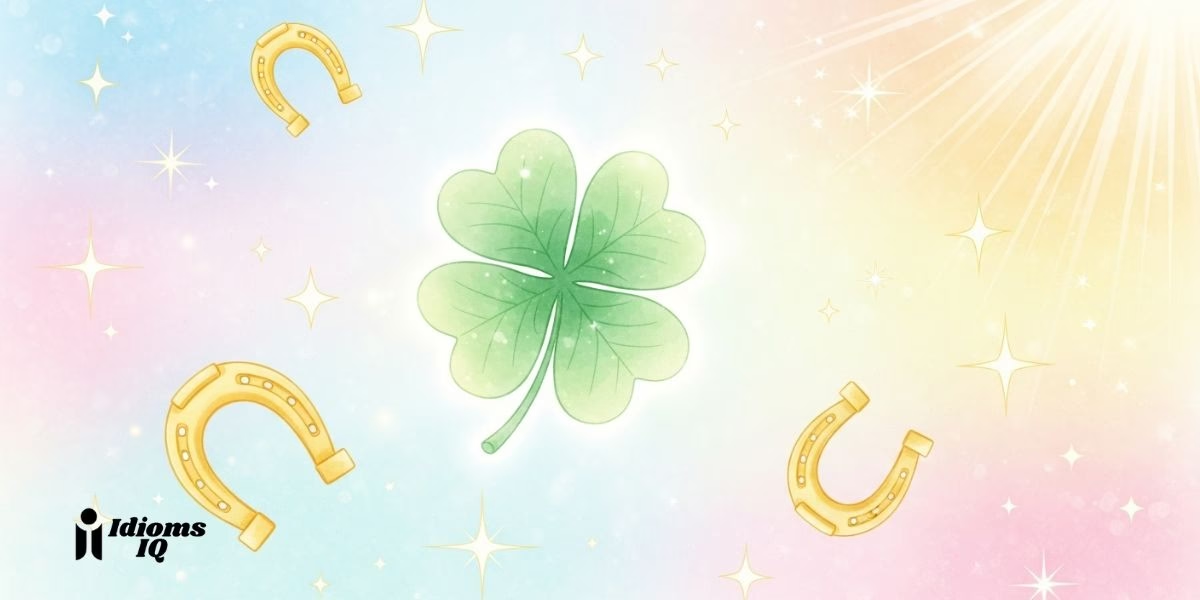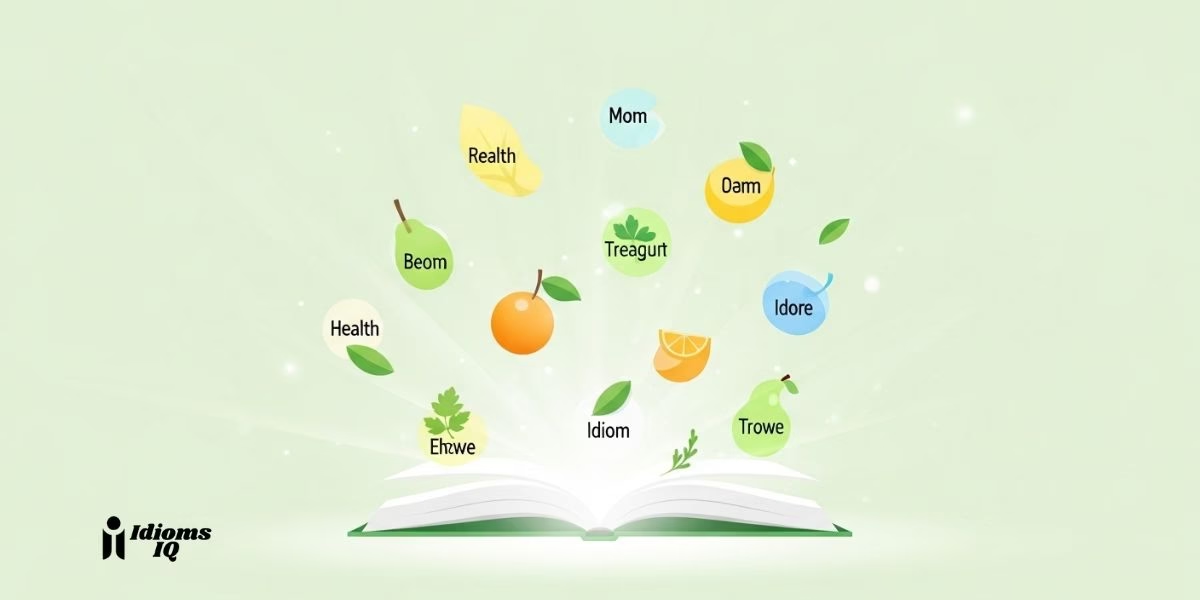
Have you ever told someone to “break a leg” before a performance? If so, you’ve used an idiom! Idioms are common phrases where the meaning isn’t what you’d expect from the individual words. They are the creative shortcuts of language that add color and personality to our conversations.
Good luck, fortune, and chance are universal concepts, and nearly every culture has developed rich, imaginative expressions to describe them. Understanding these idioms can help you sound more natural and expressive in conversation.
This article explores 40 unique idioms for good luck, complete with their meanings and examples, to help you wish others well and describe your own fortunate moments with flair.
Why We Use Idioms in Art and Language
Idioms add texture and cultural depth to our language, making it more vivid and relatable. In art and literature, they are a powerful tool for characterization and conveying emotion. Saying a character “struck gold” instantly creates a more powerful image of success than simply saying “they got lucky.”
These expressions make dialogue feel authentic and descriptions more imaginative, allowing the audience to connect with abstract concepts like luck on a more tangible and emotional level.
Related: Idioms for Excitement
Idioms for Good Luck
Here is a collection of idioms used to wish good luck or describe a fortunate situation.
Wishing Good Luck
1. Break a Leg
- Meaning: A superstitious way to say “good luck,” primarily used in theater and performance arts.
- Usage Example: “It’s opening night! Go out there and break a leg!”
- It’s considered bad luck to say “good luck” in a theater, so this idiom is used instead.
2. Knock on Wood / Touch Wood
- Meaning: To tap on a wooden object to prevent bad luck from occurring, often after making a positive statement.
- Usage Example: “I’ve been healthy all winter, knock on wood.”
- This superstition likely comes from ancient beliefs that spirits inhabited trees and wood.
3. Keep Your Fingers Crossed
- Meaning: To hope for a positive outcome or wish for good luck.
- Usage Example: “I’m keeping my fingers crossed that I get the job offer.”
- This gesture involves crossing the middle finger over the index finger as a sign of hope.
4. Best of Luck
- Meaning: A straightforward and sincere wish for someone to succeed.
- Usage Example: “I know you’ll do great on your exam. Best of luck!”
- This is one of the most common and polite ways to wish someone good fortune.
5. Blow Them Away
- Meaning: To impress someone greatly with a performance.
- Usage Example: “Go on stage and blow them away with your voice!”
- This idiom encourages someone to perform so well that it astonishes the audience.
Describing Good Fortune
6. To Strike Gold
- Meaning: To find or achieve something valuable or successful.
- Usage Example: “The author struck gold with her first novel, which became an instant bestseller.”
- This idiom references the Gold Rush era, where prospectors literally hoped to find gold.
7. A Stroke of Luck
- Meaning: A single, sudden instance of unexpected good fortune.
- Usage Example: “Finding a wallet on the street was a real stroke of luck.”
- This phrase implies that the positive event happened entirely by chance.
8. The Luck of the Irish
- Meaning: Exceptional or extraordinary good fortune.
- Usage Example: “He won the raffle twice in one night—he must have the luck of the Irish.”
- This idiom is often used with a sense of wonder at someone’s incredible luck.
9. To Hit the Jackpot
- Meaning: To achieve great success or gain a large reward, often suddenly.
- Usage Example: “She hit the jackpot when she found a rare comic book at a garage sale.”
- This term comes from winning the largest prize available in a slot machine or lottery.
10. A Lucky Break

- Meaning: A fortunate opportunity or unexpected piece of good luck that leads to success.
- Usage Example: “Getting noticed by that director was the lucky break he needed to start his career.”
- This idiom suggests a sudden positive turn in circumstances.
11. To Be Sitting Pretty
- Meaning: To be in a very comfortable, advantageous, or secure position.
- Usage Example: “After selling his company for millions, he’s sitting pretty for life.”
- This phrase implies that good fortune has led to a life free from worry.
12. To Fall on One’s Feet
- Meaning: To end up in a good situation after a period of difficulty, seemingly by luck.
- Usage Example: “He lost his job but quickly found a better one; he always seems to fall on his feet.”
- This idiom compares a person to a cat, which proverbially always lands on its feet.
13. Third Time’s the Charm
- Meaning: The third attempt at doing something will be successful.
- Usage Example: “I failed the driving test twice, but hopefully, third time’s the charm.”
- This saying expresses a hopeful belief that a third attempt will overcome previous failures.
14. A Blessing in Disguise
- Meaning: Something that seems bad at first but results in a good outcome later.
- Usage Example: “Losing that job was a blessing in disguise because it pushed me to start my own company.”
- This idiom suggests that an apparent misfortune can have hidden benefits.
15. Thank Your Lucky Stars
- Meaning: To be grateful for your good fortune.
- Usage Example: “You should thank your lucky stars you weren’t injured in the accident.”
- This idiom comes from the ancient belief that stars controlled human destiny and luck.
16. To Be on a Roll
- Meaning: To experience a continuous period of success or good luck.
- Usage Example: “She’s won five games in a row; she’s really on a roll tonight!”
- This idiom suggests unstoppable momentum.
17. As Luck Would Have It
- Meaning: A phrase used to introduce a fortunate (or sometimes unfortunate) event that happened by chance.
- Usage Example: “I was running late for the meeting, but as luck would have it, the bus arrived immediately.”
- This phrase acts as a transition to explain a chance occurrence.
18. To Lead a Charmed Life
- Meaning: To have a life that seems protected by magic, where nothing bad ever happens.
- Usage Example: “Everything seems to work out for him; he leads a charmed life.”
- This phrase suggests a person has supernatural good luck.
19. To Get Off Scot-Free
- Meaning: To escape punishment or harm completely.
- Usage Example: “He broke the vase but his sister got blamed, so he got off scot-free.”
- “Scot” was an old word for a tax or payment, so “scot-free” means to escape without paying.
20. To Be in Clover

- Meaning: To live a life of ease, comfort, and prosperity.
- Usage Example: “Once he retires, he’ll be in clover for the rest of his days.”
- This idiom references the idea of cattle being happiest when grazing in a rich field of clover.
21. To Make a Killing
- Meaning: To earn a very large amount of money very quickly.
- Usage Example: “They invested in the tech startup early on and made a killing when it went public.”
- This idiom frames exceptional financial success as being as dramatic and swift as a hunt.
22. To Hit Pay Dirt
- Meaning: To discover something very valuable or successful.
- Usage Example: “After months of research, the scientist finally hit pay dirt with her breakthrough discovery.”
- This phrase originates from mining, where “pay dirt” is soil or rock containing enough valuable minerals to be profitable.
23. To Come Up Trumps
- Meaning: To produce a surprisingly good result, often unexpectedly or at the last minute.
- Usage Example: “We thought the project would fail, but the design team came up trumps with a brilliant solution.”
- This British idiom refers to playing a trump card in card games, which outranks other cards and wins the trick.
24. Lucky Dog
- Meaning: An informal term for a person who has experienced great good fortune.
- Usage Example: “He won tickets to the concert and backstage passes. What a lucky dog!”
- This phrase is a lighthearted way to express slight envy at someone else’s good luck.
25. The Midas Touch
- Meaning: The ability to make everything one attempts successful or profitable.
- Usage Example: “Everything she invests in succeeds; she really has the Midas touch.”
- This idiom references King Midas from Greek mythology, who was granted the power to turn everything he touched into gold.
26. To Bear a Charmed Life
- Meaning: To seem magically protected from danger and misfortune; to be consistently lucky in surviving difficult situations.
- Usage Example: “He’s survived a car crash and a rock-climbing accident; he seems to bear a charmed life.”
- This phrase suggests that a person’s luck is so consistent it must be the result of a magical charm.
27. To Be Born Under a Lucky Star
- Meaning: To be naturally destined for good fortune and success throughout one’s life.
- Usage Example: “She gets every opportunity without even trying; she must have been born under a lucky star.”
- This idiom comes from the ancient belief in astrology, where a person’s fate was determined by the stars’ alignment at birth.
28. To Strike It Rich
- Meaning: To become wealthy suddenly and unexpectedly.
- Usage Example: “They hoped to strike it rich by drilling for oil on their property.”
- Similar to “hit pay dirt,” this phrase originates from prospecting, where finding a large deposit of gold was called “striking a rich vein.”
29. To Have a Windfall
- Meaning: To receive a large, unexpected amount of money or good fortune.
- Usage Example: “After receiving an unexpected inheritance, they had a windfall that allowed them to pay off their mortgage.”
- This term literally refers to fruit blown down from a tree by the wind, which could be gathered effortlessly.
30. To Be on Easy Street

- Meaning: To be in a financially secure and comfortable position with few worries.
- Usage Example: “Once he sold the patent for his invention, he knew he’d be on easy street for life.”
- This idiom paints a picture of life as a physical location where things are simple and comfortable.
31. To Have Beginner’s Luck
- Meaning: To experience surprising success when trying something for the first time.
- Usage Example: “I’d never played poker before, but I won the first three hands—it must have been beginner’s luck.”
- This phrase attributes initial success to chance rather than skill.
32. To Be Quids In
- Meaning: A British idiom meaning to be in a position where you have made a profit or gained an advantage.
- Usage Example: “After selling the concert tickets for double the price, we were definitely quids in.”
- “Quid” is a slang term for a British pound sterling.
33. To Be on to a Good Thing
- Meaning: To have found a situation, method, or activity that is profitable or advantageous.
- Usage Example: “After the successful opening weekend of her bakery, she knew she was on to a good thing.”
- This phrase implies the discovery of a reliable source of future success.
34. To Land on Your Feet
- Meaning: To recover successfully from a difficult situation.
- Usage Example: “He was laid off, but he quickly found a new job. He always manages to land on his feet.”
- This idiom creates an image of a cat always landing safely after a fall.
35. The Stars Align
- Meaning: When events come together perfectly by chance to produce a successful result.
- Usage Example: “With the best weather, all key players healthy, and a supportive crowd, the stars aligned for a perfect game.”
- This idiom again reflects astrological beliefs that planetary alignments influence events on Earth.
36. To Have Luck on Your Side
- Meaning: For chance events to consistently favor you in a particular situation.
- Usage Example: “You’ll need more than skill to win this game; you’ll need to have luck on your side.”
- This personifies luck as an ally or companion helping you succeed.
37. To Catch a Lucky Break
- Meaning: To receive an unexpected opportunity or piece of good fortune that helps you succeed.
- Usage Example: “He caught a lucky break when a famous critic reviewed his small restaurant.”
- This phrase emphasizes a single, fortunate event that changes one’s trajectory.
38. To Have a Horseshoe Up Your Sleeve
- Meaning: To have a source of hidden or incredible luck, often implying good fortune beyond normal probability.
- Usage Example: “No matter how bad the situation looks, he always comes out on top. He must have a horseshoe up his sleeve.”
- The horseshoe is a traditional symbol of good luck in many cultures.
39. To Be in the Right Place at the Right Time
- Meaning: To be perfectly positioned by chance for an opportunity to happen.
- Usage Example: “She met the CEO in an elevator, which led to her job offer. She was just in the right place at the right time.”
- This idiom highlights the importance of coincidence and timing in creating opportunities.
40. To Live High on the Hog

- Meaning: To live a very luxurious and comfortable lifestyle due to wealth.
- Usage Example: “After they won the lottery, they started living high on the hog.”
- This American idiom refers to the fact that the “high” cuts of meat from a pig (like the loin) were considered the best and were more expensive.
Practice Your New Vocabulary: Fill in the Blanks
Ready to test your luck? Fill in the blanks with the best idiom from the list.
- I have my final interview today, so please ________________ for me!
- She failed her first two attempts, but she’s hoping that ________________.
- The play starts in five minutes! Go out there and ________________!
- Losing his job turned out to be a ________________ because he found a much better one.
- He invested in that small startup before it became huge; he really ________________.
- She won a free trip to Hawaii. Some people have all the ________________.
- We only found a small part of the ancient ruins; it’s just the ________________.
- I don’t know how he does it, but he always manages to ________________ even when things go wrong.
- He’s a very successful CEO who seems to have the ________________, turning every company profitable.
- I was worried about the exam, but it turned out to be ________________.
Answers
- keep your fingers crossed
- third time’s the charm
- break a leg
- blessing in disguise
- struck gold
- luck of the Irish
- tip of the iceberg (This example can be tricky, as “tip of the iceberg” usually refers to a problem, but it fits the structure of a small part representing a whole. A better fit for a purely lucky context might be a different idiom, but this works for “small part of a larger discovery”.)
- fall on his feet
- Midas touch
- plain sailing
Conclusion
Idioms for good luck do more than just wish someone well; they add color, history, and emotion to our words. They allow us to share in the excitement of a fortunate break or offer a more meaningful “good luck” wish to a friend.
By understanding and using these expressions, you can make your conversations and writing more dynamic and creative. We hope you feel you’ve struck gold with this collection and that you’ll continue to explore the fascinating world of figurative language.






